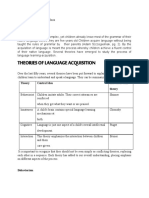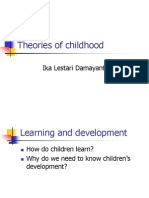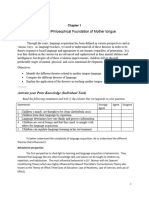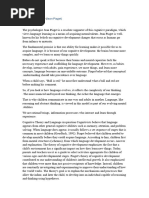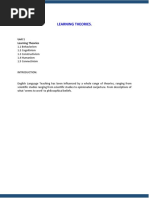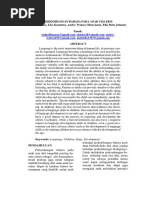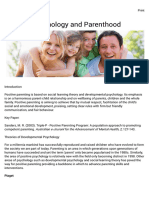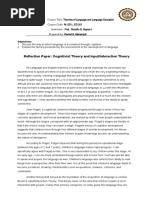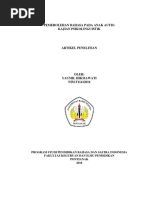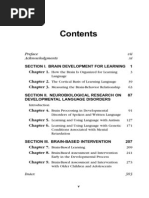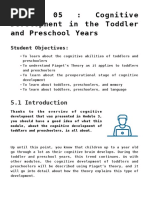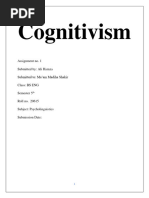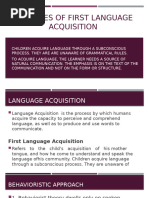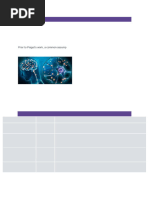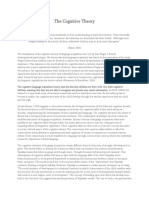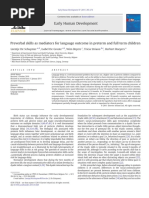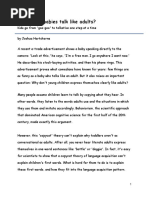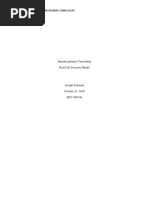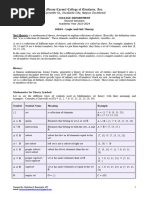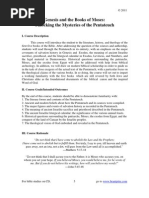0 ratings0% found this document useful (0 votes)
58 viewsTalking To Children Matters: Early Language Experience Strengthens Processing and Builds Vocabulary
Talking To Children Matters: Early Language Experience Strengthens Processing and Builds Vocabulary
Uploaded by
MacaThe study explored how the amount of speech directed at infants from Spanish-speaking families with low socioeconomic status influenced language processing development and vocabulary learning. Recordings of parent-infant interactions at home found variability in how much caregivers spoke to children. Infants who experienced more child-directed speech became more efficient at processing familiar words in real-time and had larger vocabularies by age 24 months, while overheard speech was unrelated to vocabulary outcomes. Increased child-directed speech strengthened infants' language processing skills which facilitated greater language growth and vocabulary.
Copyright:
© All Rights Reserved
Available Formats
Download as DOCX, PDF, TXT or read online from Scribd
Talking To Children Matters: Early Language Experience Strengthens Processing and Builds Vocabulary
Talking To Children Matters: Early Language Experience Strengthens Processing and Builds Vocabulary
Uploaded by
Maca0 ratings0% found this document useful (0 votes)
58 views2 pagesThe study explored how the amount of speech directed at infants from Spanish-speaking families with low socioeconomic status influenced language processing development and vocabulary learning. Recordings of parent-infant interactions at home found variability in how much caregivers spoke to children. Infants who experienced more child-directed speech became more efficient at processing familiar words in real-time and had larger vocabularies by age 24 months, while overheard speech was unrelated to vocabulary outcomes. Increased child-directed speech strengthened infants' language processing skills which facilitated greater language growth and vocabulary.
Original Description:
General Psychology
Original Title
Psych
Copyright
© © All Rights Reserved
Available Formats
DOCX, PDF, TXT or read online from Scribd
Share this document
Did you find this document useful?
Is this content inappropriate?
The study explored how the amount of speech directed at infants from Spanish-speaking families with low socioeconomic status influenced language processing development and vocabulary learning. Recordings of parent-infant interactions at home found variability in how much caregivers spoke to children. Infants who experienced more child-directed speech became more efficient at processing familiar words in real-time and had larger vocabularies by age 24 months, while overheard speech was unrelated to vocabulary outcomes. Increased child-directed speech strengthened infants' language processing skills which facilitated greater language growth and vocabulary.
Copyright:
© All Rights Reserved
Available Formats
Download as DOCX, PDF, TXT or read online from Scribd
Download as docx, pdf, or txt
0 ratings0% found this document useful (0 votes)
58 views2 pagesTalking To Children Matters: Early Language Experience Strengthens Processing and Builds Vocabulary
Talking To Children Matters: Early Language Experience Strengthens Processing and Builds Vocabulary
Uploaded by
MacaThe study explored how the amount of speech directed at infants from Spanish-speaking families with low socioeconomic status influenced language processing development and vocabulary learning. Recordings of parent-infant interactions at home found variability in how much caregivers spoke to children. Infants who experienced more child-directed speech became more efficient at processing familiar words in real-time and had larger vocabularies by age 24 months, while overheard speech was unrelated to vocabulary outcomes. Increased child-directed speech strengthened infants' language processing skills which facilitated greater language growth and vocabulary.
Copyright:
© All Rights Reserved
Available Formats
Download as DOCX, PDF, TXT or read online from Scribd
Download as docx, pdf, or txt
You are on page 1of 2
SULIT, MA. CAMILLE C.
| BS ARCHITECTURE V-4
2PPSYC1013 - GENERAL PSYCHOLOGY
Talking to Children Matters: Early Language Experience
Strengthens Processing and Builds Vocabulary
by Adriana Weisleder and Anne Fernald
Department of Psychology, Stanford University
SUMMARY
Infants differ substantially in their rates of language growth, and slow growth
predicts later academic difficulties. In this study, we explored how the amount of
speech directed to infants in Spanish-speaking families low in socioeconomic
status influenced the development of children’s skill in real-time language
processing and vocabulary learning. All day recordings of parent-infant
interactions at home revealed striking variability among families in how much
speech caregivers addressed to their child. Infants who experienced more child-
directed speech became more efficient in processing familiar words in real time
and had larger expressive vocabularies by the age of 24 months, although speech
simply overheard by the child was unrelated to vocabulary outcomes. Mediation
analyses showed that the effect of child-directed speech on expressive
vocabulary was explained by infants’ language-processing efficiency, which
suggests that richer language experience strengthens processing skills that
facilitate language growth.
How will I relate the article to our lesson?
The article above tackles the cognitive type of human development. Cognitive
development involves the mental abilities of an individual and its learning capacity.
According to Jean Piaget -- Swiss psychologist known for his work on child development
– children are neither deficient nor inferior in intelligence and is an active constructor of
knowledge. As for infants, while they all belong to the same age group, the rates of their
language growth differs. This is greatly affected by the influence everyday interactions
with their parents or other members of the family. Infants belong to the stage of Cognitive
Development called Sensorimotor Stage wherein children explore and gain knowledge of
the world primarily through their senses and motor activities.
How am I beginning to think differently?
It’s no surprise that a children’s upbringing and/or environment is what makes him/her.
However, after attending General Psychology classes and learning more about human
mental processes, I came to an understanding that things do not just happen because a
certain individual chose to. While the previous statement is also true, I have also found
out that children, infants specifically, are almost like a clean slate. Relating it to Jean
Piaget’s theories, human cognition is an adaptive ability that facilitates our survival. As
newborns, children struggles to learn and comprehend what is around them until they
understand how everything works. The article then suggests that there is actually an
explanation how baby talk works. Child-directed speech helps them enhance their
vocabulary and strengthens processing skills that facilitate language growth.
You might also like
- The Art of Critical ThinkingDocument2 pagesThe Art of Critical ThinkingAmeer Youseff MarotoNo ratings yet
- Assignment - Child Psychology - Muhammad AmarDocument28 pagesAssignment - Child Psychology - Muhammad AmarNurul Syahirah Mohamad AliNo ratings yet
- Cognitive, Perceptual, and Motor Bases of Early Language and Speech (Mr. Fachri)Document2 pagesCognitive, Perceptual, and Motor Bases of Early Language and Speech (Mr. Fachri)Mukhlisul Ibad SatriatamaNo ratings yet
- A Case Study of Live in Partner in Senior High at Dapdap High School.Document16 pagesA Case Study of Live in Partner in Senior High at Dapdap High School.andrew100% (1)
- Theories of Language Acquisition: Theory Central Idea TheoryDocument3 pagesTheories of Language Acquisition: Theory Central Idea TheoryMaria Mendoza100% (1)
- Assessment 2 Psych NotesDocument13 pagesAssessment 2 Psych Notesdohakhadija05No ratings yet
- The Music of Language Ebook 4 TDocument8 pagesThe Music of Language Ebook 4 TSimon Kinga KrisztynaNo ratings yet
- Theories of ChildhoodDocument18 pagesTheories of ChildhoodkhoerumanNo ratings yet
- Theories On Language Learning - Vygotsky, Piaget, & Habit FormationDocument30 pagesTheories On Language Learning - Vygotsky, Piaget, & Habit FormationShofia NafisahNo ratings yet
- NannyTraining Unit 6 Cognitive Development in ChildrenDocument15 pagesNannyTraining Unit 6 Cognitive Development in ChildrenKanavv BhallaNo ratings yet
- Theories On Language Learning - Vygotsky, Piaget, & Habit FormationDocument30 pagesTheories On Language Learning - Vygotsky, Piaget, & Habit FormationElysNo ratings yet
- Chapter 1 2mergedDocument16 pagesChapter 1 2mergedDomi NyxNo ratings yet
- Cognitive Theory (Jean Piaget)Document2 pagesCognitive Theory (Jean Piaget)foza920No ratings yet
- Unit 1 Learning TheoriesDocument12 pagesUnit 1 Learning TheoriesAniLu ArredondoNo ratings yet
- Perkembangan Bahasa Pada Anak Usia Dini Rizki Alfiana, Eko Kuntarto, Andry Wahyu Oktavianto, Ella Putri Julianty EmailDocument6 pagesPerkembangan Bahasa Pada Anak Usia Dini Rizki Alfiana, Eko Kuntarto, Andry Wahyu Oktavianto, Ella Putri Julianty EmailAchmad ZahidNo ratings yet
- ParenthoodDocument16 pagesParenthoodNurdani PrastitiNo ratings yet
- Assig of English For Young Children.Document19 pagesAssig of English For Young Children.S.ANNE MARY100% (1)
- Development PsychologyDocument48 pagesDevelopment Psychology2025ryanaNo ratings yet
- Essay Child DevDocument10 pagesEssay Child DevyaashiniiNo ratings yet
- Reflection Paper - Cognitivist Theory and Input and Interaction TheoryDocument2 pagesReflection Paper - Cognitivist Theory and Input and Interaction TheoryRechel MananquilNo ratings yet
- Chapter 1.baby Talk FinalDocument17 pagesChapter 1.baby Talk FinalRaniel CuetoNo ratings yet
- Pemerolehan Bahasa Pada Anak Autis: Kajian PsikolinguistikDocument13 pagesPemerolehan Bahasa Pada Anak Autis: Kajian PsikolinguistikAnnisa SilvaniNo ratings yet
- Theories of Language Acquisition: By: Joannacel AbrinaDocument20 pagesTheories of Language Acquisition: By: Joannacel AbrinaAlbert Joe Abrina100% (1)
- What Is Language AcquisitionDocument6 pagesWhat Is Language AcquisitionIva AlvinaNo ratings yet
- Language Acquisition - Reporter'sDocument9 pagesLanguage Acquisition - Reporter'sBA ELSIWANG, PRECIOUS GAYLE T.No ratings yet
- EDUC 70 Module 2.2Document4 pagesEDUC 70 Module 2.2Leslie mae GioNo ratings yet
- Observation Report On Child Language AcquisitionDocument11 pagesObservation Report On Child Language AcquisitionArisha KabirNo ratings yet
- Cognitive Development: Infants & ToddlerDocument7 pagesCognitive Development: Infants & Toddlerjeziel dolorNo ratings yet
- Written Report (Child and Adolescents)Document4 pagesWritten Report (Child and Adolescents)Mariee Begonia MacaraegNo ratings yet
- How The Brain Is Organized For Learning LanguageDocument19 pagesHow The Brain Is Organized For Learning LanguageЈован Д. РадовановићNo ratings yet
- Task 3. Empiricism Vs Rationalism-Cabido, Christine Ann C.Document4 pagesTask 3. Empiricism Vs Rationalism-Cabido, Christine Ann C.Christine Ann CabidoNo ratings yet
- Theories of Language AcquisitionDocument3 pagesTheories of Language AcquisitionThe Grizzled VetNo ratings yet
- 05: Cognitive Development in The Toddler and Preschool YearsDocument9 pages05: Cognitive Development in The Toddler and Preschool YearsŞterbeţ RuxandraNo ratings yet
- Hannah AssignmentDocument11 pagesHannah AssignmentHannah MutsenhuNo ratings yet
- Cognitivism AliDocument10 pagesCognitivism Alidaadakram1No ratings yet
- Human Develop GRP 10Document17 pagesHuman Develop GRP 10sheanotidamutyambiziNo ratings yet
- Language Acquisition TheoryDocument2 pagesLanguage Acquisition TheoryCherry Lyn Aguilar FranciscoNo ratings yet
- Aprendizaje Ingles en NiñosDocument5 pagesAprendizaje Ingles en NiñosMaria Carolina MejiaNo ratings yet
- Nature Vs Nurture NotesDocument6 pagesNature Vs Nurture NotesAnisa MughalNo ratings yet
- Cognitive Development of Infants and ToddlersDocument30 pagesCognitive Development of Infants and ToddlersanovalexterNo ratings yet
- Reflection Paper #03Document4 pagesReflection Paper #03Guiann Maris LumanasNo ratings yet
- Theories of First Language Acquisition (G2)Document25 pagesTheories of First Language Acquisition (G2)zai15garciaNo ratings yet
- WEEK 1-Group OneDocument10 pagesWEEK 1-Group Oneamy hillNo ratings yet
- Early Brain Development Research ReviewDocument5 pagesEarly Brain Development Research ReviewDwi Astika SariNo ratings yet
- Memory BilingualismDocument7 pagesMemory BilingualismKristine Kaye G. LagguiNo ratings yet
- Final Module in Principles and Theories in Language AcquisitionDocument14 pagesFinal Module in Principles and Theories in Language AcquisitionChristel VirtucioNo ratings yet
- Final CapstoneDocument14 pagesFinal Capstoneapi-434974983No ratings yet
- CHILDCARE FULLDocument107 pagesCHILDCARE FULLspit35117No ratings yet
- Child and AdolescenceDocument23 pagesChild and AdolescenceYvonne BulosNo ratings yet
- HLC 1.4preschool Devt - MalinitDocument5 pagesHLC 1.4preschool Devt - Malinitlovelots1234No ratings yet
- The Cognitive TheoryDocument2 pagesThe Cognitive TheoryAndres CruzNo ratings yet
- Submitted To: Submitted By: Semester: Section: Roll No:: Mam Areeb Sajid Maidah Noor 5 A BAPY-22-17Document6 pagesSubmitted To: Submitted By: Semester: Section: Roll No:: Mam Areeb Sajid Maidah Noor 5 A BAPY-22-17Umair anwar Umair anwarNo ratings yet
- A Level English Language S4.4 Theories About Language DevelopmentDocument11 pagesA Level English Language S4.4 Theories About Language Developmentcucumber5621No ratings yet
- Early Human Development: Leentje de Schuymer, Isabel de Groote, Wim Beyers, Tricia Striano, Herbert RoeyersDocument8 pagesEarly Human Development: Leentje de Schuymer, Isabel de Groote, Wim Beyers, Tricia Striano, Herbert RoeyersPabloNo ratings yet
- Language Acquisition TheoriesDocument5 pagesLanguage Acquisition Theoriespaulina.swiechunioNo ratings yet
- Jean Piaget ProjectDocument13 pagesJean Piaget ProjectRoland Aparece100% (1)
- Eng 207 Term Paper-1Document12 pagesEng 207 Term Paper-1nilimah231No ratings yet
- Why Don't Babies Talk Like AdultsDocument4 pagesWhy Don't Babies Talk Like AdultsPan Thet NaingNo ratings yet
- First Three Years - Cognitive DevelopmentDocument5 pagesFirst Three Years - Cognitive DevelopmentRen TengedanNo ratings yet
- Nature or NurtureDocument9 pagesNature or NurtureNathalieFlores93No ratings yet
- Child Development Essentials For Parents: Science For Everyday Life, #1From EverandChild Development Essentials For Parents: Science For Everyday Life, #1No ratings yet
- Module 6 - PHILOSOPHYDocument8 pagesModule 6 - PHILOSOPHYMaria Sophia UmaliNo ratings yet
- There S No Testimonial Justice Why Pursuit of A Virtue Is Not The Solution To Epistemic Injustice PDFDocument23 pagesThere S No Testimonial Justice Why Pursuit of A Virtue Is Not The Solution To Epistemic Injustice PDFana lauraNo ratings yet
- Energetic Kinesiology35Document1 pageEnergetic Kinesiology35Marius Dan GiolgauNo ratings yet
- Materi Lingu 2Document4 pagesMateri Lingu 2Medina YasminNo ratings yet
- Goddess MaatDocument12 pagesGoddess MaatTemple of the stars100% (1)
- Speech Acts TestDocument10 pagesSpeech Acts TestJohn Normandia100% (1)
- Spring 2009 Homeless Garden Project NewsletterDocument6 pagesSpring 2009 Homeless Garden Project Newslettercalderdavid35No ratings yet
- Interdisciplinary ModelDocument12 pagesInterdisciplinary Modelapi-346211152No ratings yet
- Push Down AutomataDocument33 pagesPush Down AutomataMithun SudheendranNo ratings yet
- Impact of Co-Curricular Activities On Curricular Activities (Mehwish ShaDocument48 pagesImpact of Co-Curricular Activities On Curricular Activities (Mehwish ShaMuhammad Nawaz Khan Abbasi82% (11)
- Cebuano Literature TopicDocument3 pagesCebuano Literature Topic정공주님0% (1)
- Edu200 Philosophical Perspectives in Education Parts1 4.HTMLDocument10 pagesEdu200 Philosophical Perspectives in Education Parts1 4.HTMLTrisha MarieNo ratings yet
- Republic Act No. 6713: Code of Conduct & Ethical Standards For Public Officials and EmployeesDocument25 pagesRepublic Act No. 6713: Code of Conduct & Ethical Standards For Public Officials and EmployeesJordan Pendosan LalioNo ratings yet
- 12 - Chapter 4 PDFDocument47 pages12 - Chapter 4 PDFaqsa zafarNo ratings yet
- (VigChr Supp 056) Pier Franco Beatrice - Anonymi Monophysitae Theosophia, An Attempt at Reconstruction 2001 PDFDocument218 pages(VigChr Supp 056) Pier Franco Beatrice - Anonymi Monophysitae Theosophia, An Attempt at Reconstruction 2001 PDFNovi Testamenti Filius100% (3)
- The Minor Gesture by Erin ManningDocument36 pagesThe Minor Gesture by Erin ManningDuke University Press100% (7)
- Assesing Attribute ImportanceDocument6 pagesAssesing Attribute ImportanceJorge Muñoz AristizabalNo ratings yet
- EXO LyricDocument22 pagesEXO Lyricgroshia100% (1)
- Continuum Companion PhonologyDocument540 pagesContinuum Companion PhonologyAlexander Ramírez100% (1)
- Full Jazz and The Philosophy of Art Lee B. Brown PDF All ChaptersDocument52 pagesFull Jazz and The Philosophy of Art Lee B. Brown PDF All Chaptersxhidamamome100% (2)
- UG E and F Handbook 2013 42Document35 pagesUG E and F Handbook 2013 42danNo ratings yet
- Lesson 4 - How Are You Mark-UpDocument25 pagesLesson 4 - How Are You Mark-UpSupun wasanaNo ratings yet
- DirectingDocument67 pagesDirectingV_RN100% (1)
- Set Theory HandoutsDocument7 pagesSet Theory Handoutssofiachoi37No ratings yet
- Genesis Books of MosesDocument59 pagesGenesis Books of MosesJorge Luis ZarazuaNo ratings yet
- Robert L. Thomas-New HermeneuticsDocument24 pagesRobert L. Thomas-New HermeneuticsDavid Salazar100% (1)
- Field TheoryDocument22 pagesField TheoryTamaraNo ratings yet
- (Eden) Studies in Urban TheoryDocument20 pages(Eden) Studies in Urban TheorySofía PiZo EscalanteNo ratings yet




